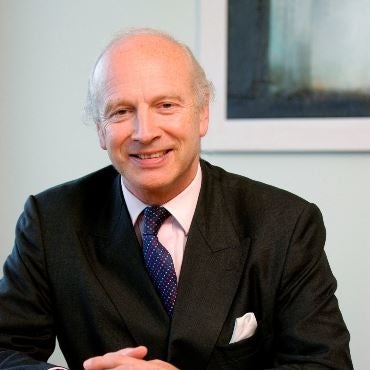Governance: The Board
Share
- Details
- Text
- Audio
- Downloads
- Extra Reading
By what measure should a Board judge its own performance, and what should it do if found wanting? Is there an optimum size and balance, and is there a size beyond which it is very difficult or impossible to manage? What is the responsibility of of Boards to shareholders? How should boards be conducted, particularly as between operational and strategic matters, and what sort of management information should they receive?
Download Text
GOVERNANCE: THE BOARD
Daniel Hodson
Emeritus Mercers' School Memorial Professor of Commerce
This year I am changing both the format and the base subject for my six lectures. So far as the latter is concerned my general topic is Governance. Of course much heat and light has been expended on the subject at every level and in a multiplicity of forums. Three major committees have opined over the last few years - Cadbury, Greenbury and Hempel. My approach is to deal with issues of very significant importance which may not be specifically covered by the codes which have emerged from the formal committees, and to set out a number of propositions for further discussion.
To make this more stimulating and to provide a broader perspective, I've asked a number of business friends to join me to join in the debate, and this evening I'm delighted to be able to welcome two very distinguished people, Brandon Gough and Peter Morgan.
I first met Brandon in the late 80s when he was, if I may say so, an impressively young Chairman of Coopers and Lybrand. In 1994 he set forth into the world of pluralism, as it seems to be called, and has had a number of board roles since which make him eminently well qualified to join the debate tonight. Most topically perhaps he has been a director of National Power last year and had had a key role in a major review of strategy, leading to the resignation of the CEO and the recent splitting of the company into two parts. He was Deputy Chairman of Warburgs following the abortive merger with Morgan Stanley and during the subsequent split and disposition of the bank; and he took over the helm at Yorkshire Water as Executive Chairman, dealt with the issues that then confronted the company appointed a CEO and reverted to non-executive status. As if that wasn't enough for one lifetime, he has been Chairman of the Higher Education Funding Council for England and is currently Chairman of De La Rue.
Peter is a much more recent acquaintance, both of us being appointed as consultants to the board of a private company, in which role I think we immodestly can say that we did some good, but I for one will not be drawn any further. He spent much of his career at very senior levels in IBM, and was headhunted to become Director General of the Institute of Directors in 1989, a job which made him a national figure. Plural since then too, he has chaired a number of companies, including SWALEC, Pace Micro Technology, National Provident Institution and KSCL, from which experience he will no doubt have a tale or two. He is currently inter alia, Chairman of Baltimore Technologies and a director of Oxford Instruments. And both my guests have one interesting thing in common - Peter is currently and Brandon has been a member of that fascinating instrument of corporate governance, the Council of Lloyds, of which no doubt more anon.
I shall now set the scene for a few minutes, to be followed by some comments from my friends on each, interspersed I hope with thoughts from those of you in the hall itself.
The focus this evening is on the Board and the way in which it conducts its business. In this case I refer to plc and cooperative Boards and the Boards of private companies who have deliberately chosen to model themselves on plc governance. I have no doubt however that there will be a significant read across to other forms of board, eg school governors and trustees of charities.
I well remember joining my first board over 25 years ago, and being greeted cheerfully by the Chairman with the immortal words: 'Congratulations, and welcome to the thankless task that lies ahead'. Unfortunately I've more than several opportunities since to ruminate on how right he was.
Given the time available I would like to concentrate the debate on a limited number of propositions. I must say at the outset that these do not necessarily represent my own point of view, but are put forward to stimulate argument
Boards should concentrate almost exclusively on strategic matters, and making sure that the right people are in place to carry out their decisions. Boards should regularly review their own performance and their members, including the Chairman. The performance of NEDs should be appraised just like any other member of management. The Board should regularly review its own governance procedures, and stick to the ground rules it sets itself Boards should never exceed 12 in number with balanced numbers of non-execs and executives, with an optimum around 8. NEDs should bring specific and useful skills to the table. Boards should continuously review the nature and quality of information they receive, to ensure that it is appropriate for the discharge of their function . The overriding duty of the Board, apart from statutory requirements, is to look after the interests of the shareholders. Benefiting stakeholders supports this objective but is not sovereign in its own right.
A good place to start, and one which may not prove too controversial, is the fundamental role of the Board in relation to the affairs of the company. My proposition is that the Board is principally acting, always within the law, on account of shareholders (I shall return to the theme of stakeholders later); and that its two other main accountabilities should be for the strategy and strategic decision making of the organisation, and to ensure that the correct structure and senior personnel are in place to see the strategy through and to manage the day to day requirements of the business. I leave aside of course the statutory requirements of Boards: for instance approval of accounts and receiving the reports of mandatory subcommittees.
It is my view that many Boards fail in effective discharge of their duties by concentrating too much on microeconomic operational supervision. The LIFFE Board, of which I was a member for nearly 6 years, was a classic example of this. We had several entertaining, but essentially time wasting discussions about the price of sandwiches in the Exchange canteen, and most of the precious time available was spent discussing operational matters, many not much more exalted than sandwiches. As an aside, it is my view that any board meeting which lasts more than 3 hours is well into extra time, given the powers of concentration and intellectual stamina of most human beings
Nor in my experience was LIFFE in any way unique. Whilst Boards have a duty to hold management responsible for the stewardship of the business, the bulk of their time should be spent on strategic matters, but the temptation in so many places is to avoid the former and concentrate on the latter.
Another associated issue is to make sure that strategic issues are indeed debated and determined at the Board. Boards regularly fail in their performance by allowing important strategic decisions to be made by default, by ignoring them and letting events unfold as they will, or by such a decision being made down the line by management without reference to the Board at all.
It is increasingly best practice for Boards to spend one to two days a year off site to set the strategic framework and strategic priorities of the business. Such a framework should be flexible according to need, but should represent the point of reference for all strategic Board decisions. Indeed, too many Boards make strategy on the run and respond to opportunities without applying the simple test: is this in accordance with our strategy and priorities? I've known a number of chairman and/or chief executives who have given the impression that their existence is justified by a deal a month, and that sticking to the knitting is a flat bore. One Chairman I knew found strategic matters so tiring that he couldn't be in the room when they were discussed, but he did love buying and selling businesses. There is no doubt in this era of unceasing and detailed stock market scrutiny that having a clearly articulated strategy and sticking to it - focus - is a great contributor to shareholder value.
In these days of accountability, Boards certainly ought regularly to monitor and critique their performance. In practice very few do, and certainly few Boards with which I have been involved. This could be achieved in two ways. On an ad hoc basis all strategic decisions (and indeed capital investment decisions) should be reviewed at least once at appropriate later dates. This process of Post Investment Review, a normal part of good management practice within the organisation, ought just as well to apply to the Board. It is a refreshing and often painful, but useful exercise for a Board openly to discuss and to reach conclusions on questions in relation to specific projects such as: How did we do? What lessons can we learn? How can we do better? Should we change our approach? After all 360 degree appraisal, (ie by one's subordinates and peers as well as by one's seniors) is now an accepted part of good management practice. And it would be fascinating and probable highly instructive to know what the next tier of managers down thought of the performance of their Board.
A formal annual review of strategic Board performance would also be important, perhaps as part of the offsite activities referred to. Again the sort of questions ought to be: Did we make the right decisions? What decisions should we have taken that we did not? And, perhaps, most difficult, are we constructed in the most effective way and how was individual performance? I wonder how many boards would actually pass muster.
It is a salutary fact that NEDs tend to have greater longevity on the Board than their executive colleagues. There may be some sensible reasons for this of course - continuity, knowledge and preservation of independence for instance - but I can think of several situations to my personal knowledge where inertia, the old boy network, even the Chairman's and/or CEO's self protection mechanism, have led to an NED's over-lengthy tenure - and consequently less than useful value from that particular board slot. The value and performance of NEDs should also be scrutinised regularly and be a recognised part of Board routine. This might be done by a combination of the Chairman and the Senior NED, the latter being one of the most useful relatively mandatory concepts to emerge from the three great committees to which I referred earlier. I have to say that a Chairman and/or a senior NED never gave me, as an NED, a critical appraisal, or indeed any appraisal at all (I'm sure that I fully deserved the latter on numerous occasions). This process might of course on occasion go as far as an invitation to leave the Board.
On the subject of NED qualifications, one Board on which I sat had a couple of knights in harness, and the remaining NEDs were mystified as to why their papers always arrived addressed to them with a similar gong applied. One ventured to suggest that the PA responsible thought that being a member of that Board automatically brought a knighthood, to a rather humourless response from the two real knights who were rather proud of the external successes that had led to their investiture.
The same rigour of appraisal ought also in logic apply to the Chairman, and here again the role of the Senior NED takes on a crucial responsibility. In recent years there have been a number of often well deserved putsches by NEDs against Chairmen, but as often there are Chairmen who regard their positions as jobs for life and secure against all comers.
It is well worth adding that the combination of bad Chairman and/or bad NEDs can so often be the undoing of otherwise able CEOs, who are nearly always made the scapegoats for strategic or operational failures when the true fault might have lain with others, less visible, on the Board. Admittedly there is a school of thought which suggests that CEOs should include 'Board Management' amongst their required skills. I personally believe that this is one of the key requirements of the Chairman, but not necessarily the CEO. Rather the former should thereby cover the latter's back so that he can concentrate on operational matters.
Boards of actual or recently demutualised cooperatives are so often examples of nailing the CEO for corporate setbacks, when the strategy for which the wretched individual was topped was in reality the Board's and very much imposed on him. The Board of LIFFE used to like to take a clear 'We're in charge' attitude to strategy when I was CEO there, although they were rather less good at the more practical business of making their minds up. A much more topical example is the defenestration of Gavin Casey at the London Stock Exchange for carrying out a strategy which everybody knew was the brainchild of others, and the Board, and specifically individuals on it, simply ordered him to get on with it. Which he did, and paid the price, while they remained out of sight. A CEOs life, and indeed corporate death, can be very unfair.
One of the more difficult aspects of Board governance, particularly as an incoming NED, is to ensure that the appropriate procedures - such as those suggested above - are in place. Other such procedures might be the existence and terms of reference of Audit Committees and Remuneration Committees. It is all too often the case that those associated with the status quo - the Chairman and the CEO in particular - will see a threat to a cosy existence and/or an implied criticism and will dig their heels in. But it is fundamental in my mind that Boards should review their governance procedures annually and examine them in the light of best practice, the needs of the business, and the interests of the shareholders.
One issue they would certainly do well to include on that list is the size of the Board. Boards are in so many respects very organic creatures and operate best when they are small enough for conversation and discussion to be at a normal level and for a team spirit to pervade, and large enough to provide the right balance of input for strategic decision making. There is still a tendency for boards to grow into parliamentary size usually because of the perceived need for as many constituencies as possible to be represented (cooperatives being a prime example) and/or because being on the Board created a cachet which had no resemblance to or even desired responsibility for qualification for that Board (as in investment banks and advertising agencies). I have two such jumbo boards on my CV. First Nationwide Anglia Building Society (as it then was) which had swelled to include the directors of both the two constituent societies, Nationwide and Anglia. The management of the NEDs of Anglia proved to be one of the more sensitive aspects of the merger, for the job was one of the rewards for municipal success for the good burghers of Northampton and until the merger not only carried a pension, but also a Daimler Sovereign or its equivalent.
LIFFE was an entirely different matter. It was of course cooperative in governance and ethos, with a number of different constituencies ranging from single traders at on extreme to huge international conglomerates at the other, with special interest groups, such as equity option and commodity specialists in the middle. At its zenith it numbered 25. Confronted with issues - some footling, some of huge importance - it became a fractious and longwinded debating society with little sense of teamwork or common purpose. Furthermore, it tended to be dominated by a handful of loud, articulate and opinionated voices, yet it was so often the silent majority who needed to be heard and often represented more balanced and wiser views. Indeed on contentious issues it was nigh on impossible to get a consensus and there was constant recourse to voting; the impact of this was that the divisions usually carried on beyond the vote and onto the street outside, whereas the desirable objective of a board split in debate on any issue is that once the vote has been taken and/or the majority view identified, the members will rally round and accept a high degree of corporate responsibility even if theirs was the minority view. It was also a nightmare to chair. It was indeed the very antithesis of the effective, but representative decision making organ a board should strive to be.
As an aside, many experienced Chairmen make it a rule not to call for a vote. If a consensus cannot be reached then the matter is shelved or deferred. On that basis I have served on several boards whose business would have been permanently grid-locked, if such a rule had been followed.
What is the maximum effective size for a board? It is very much a matter of judgement, but in my experience twelve is beginning to stretch the criteria of sensible, balanced debate and ability to maintain the sense of team commitment. It is often argued, particularly in a cooperative environment, that the need for broad representation calls for higher numbers, and if there is to a limit of, say, a dozen, it should be accommodated at the expense of the executive members. There are two reasons why this is potentially folly: first it cannot achieve executive commitment to the decision making process, for they will feel naturally excluded, and second it loses the key input that those who actually live daily with the issues and actually have to implement the decisions can bring.
Equally, contrary to some precepts, I believe that boards can be too small, a typical example being a Chairman, CEO, and a couple of NEDs, perhaps with a Finance Director in tow, masquerading as Company Secretary. The question is whether such a tight unit can muster the breadth of experience and depth of knowledge effectively to make the strategic decisions expected of it. Nor does it bind in other key executives, who will feel less committed to the resultant decisions.
In my mind, the best number is 6 to 10. Team spirit and a feeling of shared experience and responsibility is all important, and all too rare to make the Board an effective unit. This does not call for constant agreement, but rather reasoned and civilised debate. Nor does it call for all members to like each other, any more that it does in great sporting teams. Creative tension between individuals can add immeasurably, if properly channelled, to the quality of the debate. Certainly the best and most effective boards of which I have been a member (for reasons of personal safety I shall not judge upon my present portfolio) have been small, balanced and with more or less equal numbers or executives and NEDs, some of whom did not get on at all well outside the boardroom - and, of course, well chaired.
A governance review might also cover Board information, a dull topic perhaps, but in my mind key. In discharging its duty it is essential that a Board knows what is going on in the business, not only at a strategic level, but in order to make sure that the executive is fulfilling its operational duties, as well as to understand what the crucial issues are facing the business, and perhaps, based on its collective experience to spot them at an early stage in order to control them.
All well run businesses supply boards with appropriate levels of financial information, and, as importantly, some, but by no means all, broaden them into what have become known as Key Performance Indicators or KPIs. The latter are, broadly, non-financial and often qualitative measures of performance, historical and forecast. Yet another lecture would deal with only a fraction of this topic, and even them, unsurprisingly, the appropriate KPIs would very greatly from business to business.
Many managements in my experience do not enjoy giving the Board the information it ought to have, and have to have it dragged out of them, if indeed it is readily available anyway. Again the best way round this would be to have an annual appraisal, of the quality, quantity and appropriateness of the information it receives. Quantity is very important, because too much - resulting in over-managing or too little - resulting in bad decisions - can be equally fatal. I cannot think of a single board with which I have been associated that has taken this approach. Instead an ad hoc approach is the most common, with the information often being requested after a setback which could probably have been avoided had the Board had the relevant information routinely.
Finally, it has long between conventional wisdom that Boards should serve the interests of shareholders. But should Boards take into account the interests of other stakeholders in their deliberations, and indeed occasionally regard them as paramount, even above the shareholders themselves? By stakeholders (a rather politically correct word) I mean inter alia regulators, employees, customers, suppliers, environment, local community etc. This is a subject for a lecture in its own right, but I shall short circuit that by a flat assertion. Certainly Boards should take a balanced view of the interests of stakeholders in all their decisions. Indeed it can be powerfully argued that in so doing they will directly or indirectly benefit the commercial success of the business, and thus the shareholders. Indeed most Board decisions will affect most stakeholders in the ultimate. But paramount always, or on occasion? In the end it is shareholder value which counts. The considered, farsighted and balanced treatment of stakeholders will only serve to enhance that value.
Enough from me. Six weighty topics, and much for us to discuss. To repeat them: overridingly strategic duties, regular self appraisal, regular review of governance procedures, size and constitution, appropriate information and importance of stakeholders. I turn now to my colleagues.
© Daniel Hodson
This event was on Thu, 19 Oct 2000
Support Gresham
Gresham College has offered an outstanding education to the public free of charge for over 400 years. Today, Gresham College plays an important role in fostering a love of learning and a greater understanding of ourselves and the world around us. Your donation will help to widen our reach and to broaden our audience, allowing more people to benefit from a high-quality education from some of the brightest minds.


 Login
Login







